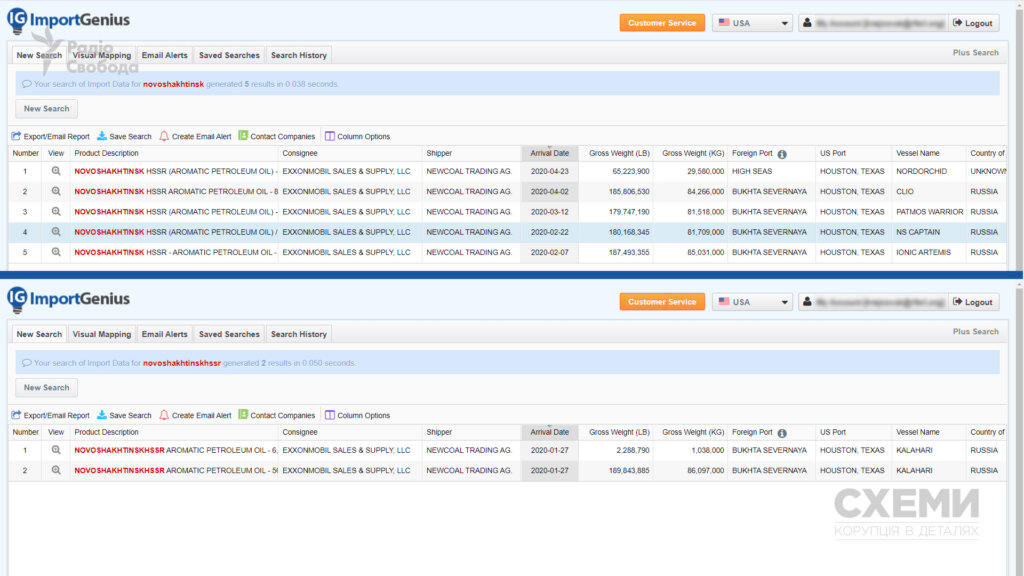Novoshakhtinsky Oil Refinery in Russia, controlled by the family of Viktor Medvedchuk, sells its products to the U.S. corporation ExxonMobil. Medvedchuk is the head of the Opposition Platform – For Life party’s political council and a crony of Russia’s President Vladimir Putin. Medvedchuk has been under the U.S. sanctions since 2014.
The supplies take place by tankers from the Black Sea’s neutral waters to the port of Houston in the U.S. Still, the sales do not occur directly but through a Swiss intermediary firm associated with a member of the Russian Federation’s State Duma.
JOIN US ON TELEGRAM
Follow our coverage of the war on the @Kyivpost_official.
This was revealed by an investigation of “Schemes,” an investigative journalism project of Radio Free Europe/Radio Liberty and Ukrainian public TV station UA:Pershy.
Medvedchuk refused to comment on business issues to “Schemes” journalists.
Novoshakhtinsky oil refinery is located in the Rostov region of Russia. According to Medvedchuk’s declaration, most of the company belongs to his wife, Oksana Marchenko.
Journalists cite data from the international customs database ImportGenius. According to them, the Novoshakhtinsk oil refinery’s products were received at least six times in 2020 by ExxonMobil Sales and Supply LLC (a structural subdivision of the American corporation ExxonMobil). It is straight-run aromatic petroleum oil – a semi-finished product often used by American plants to save on oil.
In addition to documenting these operations, “Schemes” also tracked the routes of tankers delivering cargo from Rostov to the port of Houston (Texas, U.S.) by analysis of the data, provided by the MarineTraffic service.
In January, the Kalahari tanker delivered to Houston 87,000 tons of oil products. On Feb. 7, 85,000 tons were delivered by the Ionic Artemis vessel. On Feb. 22, the NS Captain ship delivered another 82,000 tons. On March 12 – another 82,000 tons were delivered by the ship Patmos Warrior vessel. On April 2, 2020, the Clio tanker delivered 84,000 tons of Novoshakinsk oil products to ExxonMobil. On April 23, the Nordorchid tanker arrived in the port of Houston with a cargo of 29,000 tons. The contracts’ values are kept secret, but the market value of the similar straight-run product in 2020 ranged between $30 and $40 per barrel, so the average cost of these supplies from Medvedchuk’s Russian refinery to Texas is estimated at about $150 million.
Journalists note that all tankers with straight-run fuel oil arrived in the United States from the Black Sea’s neutral waters – across the Kerch Strait. For a long time, three large storage tankers (Sanar-7, Sanar-8, and Boray) owned by Medvedchuk’s wife Marchenko through the Russian company Rosewood Shipping have been almost stationary in the same zone.
During the correspondence, Rosewood Shipping employees admitted that storage tankers receive oil products from the company’s smaller vessels (Sanar-1, Sanar-2, Sanar-3, Sanar-4, Sanar-5). And then there is an overload on other tankers which carry out delivery to ports. This version was confirmed by the data of the MarineTraffic system, which monitors the movement of ships.
At the same time, journalists note that ExxonMobil Corporation did not buy oil products directly from the Medvedchuk-Marchenko’s refinery, but from the Swiss company NewCoal Trading. Investigative journalist and editor of the Scanner project portal Mikhail Maglov links the NewCoal Trading company through “Rutek” holding to the family of Gleb Khor, a member of the Russian State Duma for the “United Russia” party. Khor himself has never denied his connection to Rutek. “Schemes” sent an inquiry to the member of the State Duma.
“Schemes” asked ExxonMobil to comment on the purchase of oil products at the Novoshakhtinsk Petroleum Products Plant. Here is the position of the corporation:
“We do not comment on third party statements, speculation, or rumors. ExxonMobil continues to comply with all applicable sanctions. It is the policy of ExxonMobil and its affiliates to comply with all governmental laws, rules, and regulations applicable to its operations within and outside the United States and to conduct those operations to the highest ethical standards. ExxonMobil also expects its suppliers, vendors, and contractors to comply with laws, rules, and regulations applicable to their businesses.”
Medvedchuk has been under U.S. sanctions since 2014. Former U.S. State Department sanctions coordinator Daniel Fried told reporters that the sanctioned individuals were “blocked from having a Western credit card, bank account, check account, financial interests in the West are quite limited, they are frozen.” Simultaneously, commenting on the scheme of selling oil products from a refinery controlled by the Medvedchuks family to the United States, Daniel Fried said that “this is the type of information that the Office of Foreign Assets Control or others can verify.”
According to the international company S&P Global, the share of Russian straight-run fuel oil in the U.S. market increased in late 2019 due to the cessation of Venezuela supplies. From November 2019 to June 2020, the company notes that Russia’s share in the semi-finished product supplies to U.S. plants was 58%, i.e., more than 24 million petroleum products barrels. About one-eighth of this volume was made up of supplies from the Medvedchuk-Marchenko family’s refinery, which was reported by “Schemes” journalists.
According to Russian media reports, the Ministry of Economic Development of the Rostov Region supported the refinery locally. In 2019, the Ministry of Energy of the Russian Federation and Novoshakhtinsky refinery had signed an agreement. According to it, the company invests in modernization. In return, it receives a refund of excise duty on oil, which means reducing the tax burden on the refinery and increasing profits.
In 2019, the Medvedchuk-Marchenko’s refinery, according to the Russian state information resource of financial statements, received a record profit compared to several previous years – 3.6 billion rubles.
You can also highlight the text and press Ctrl + Enter





